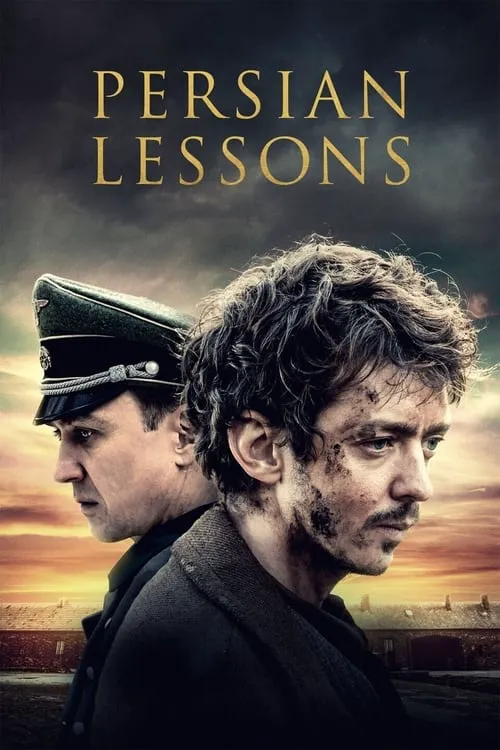Persian Lessons

Plot
In the midst of the turmoil and horrors of World War II, a gripping and unconventional story unfolds in "Persian Lessons". Set in the tumultuous year of 1942, occupied France is a treacherous place, where one misstep can mean the difference between life and death. It is here that we meet Gilles, a young man who, alongside other Jews, is arrested by the ruthless SS soldiers. As Gilles faces possible execution at the hands of his captors, he seizes upon an opportunity to save his own skin. In a desperate bid to stay alive, Gilles tells the guards that he is Persian, rather than Jewish. His gamble pays off, as it proves enough to persuade them that he is not a Jewish prisoner. However, as the lie gains traction and his guards begin to believe it, Gilles is thrust into a precarious new situation. The head of the camp, the inappropriately named Koch, is an eccentric man with an unusual passion – he yearns to open a restaurant in Iran once the war is over. Seeing the world as a place of culinary delights and wonder, Koch is determined to bring a touch of Iranian culture into his life, and into his beloved dishes. As a result, he orders his guards to find someone who can teach him the basics of Farsi, the language spoken in Iran. Gilles, desperate to keep up the charade, is appointed to the role, a position that could spell his doom should he be caught. With the fate of his own life hanging precariously in the balance, Gilles sets to work with a newfound sense of urgency and creativity. Recognizing that he has just a few hours to learn as much Farsi as he can, Gilles begins to think on his feet, inventing words and expressions as he goes. This is where the true art of survival comes into play. Gilles cleverly invents Farsi phrases and words, drawing upon other languages and words he has studied in the past to create a makeshift form of Farsi that Koch could understand. Every day, Gilles teaches these new words to Koch, who gobbles them up like a hungry tourist devouring exotic dishes. As the days go by, Gilles finds himself trapped in a surreal world of pretend, with no clear end in sight. Through it all, Gilles finds moments of levity and humor, which provide a much-needed respite from the intense, high-stakes situation in which he finds himself. Despite the horrors of the war and the precarious nature of his existence, we see glimpses of the human spirit at its best. Gilles's wit and determination inspire us, even as they remind us of the terrible costs of war. As the story unfolds, we begin to see a nuanced, human side to Koch, a man who is less a monster and more a complex, multifaceted character. This subtle portrayal challenges our expectations and deepens our understanding of those who might seem one-dimensional at first glance. Whether it's Gilles or Koch, each character is a multifaceted, fully realized human being, each with his own story to tell. Ultimately, "Persian Lessons" is a gripping, thought-provoking film that raises questions about the nature of truth and identity. In a world where the lines between reality and fantasy are constantly blurred, we see how even the smallest, most seemingly insignificant lie can have far-reaching consequences. By the end of the film, we are left to ponder the moral complexities of Giles' deception, and the ultimate cost to Koch's sanity. The movie raises questions about what it means to be a hero, and whether survival at any cost, even if it means maintaining a lie, is worth more than honesty, when honesty might lead to death. The film "Persian Lessons" is an engaging and thought-provoking reflection on the human spirit and its capacity to adapt and survive in the face of overwhelming adversity. It challenges viewers to think deeply about the nature of truth, language, and identity, and invites us into a world of intrigue, deception, and ultimately, transformation.
Reviews
Recommendations




